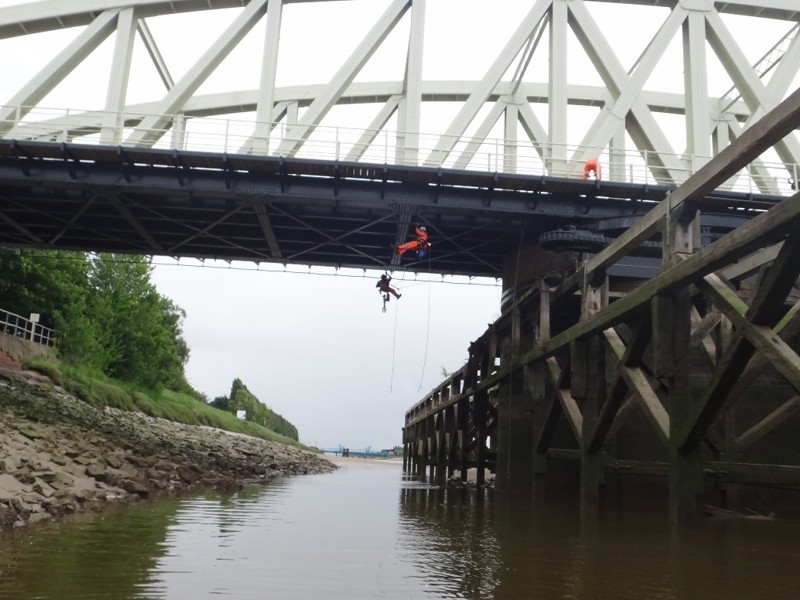Amey provides asset management services to Network Rail through the Civil Examination (CE) and Civil Assessment (CA) Framework Agreements (CEFA & CAFA) respectively. These are ‘Essential’ services which enable the railway to operate safely across the country. Amey undertakes over 100,000 surveys for Network Rail annually, through dedicated teams who provide 24/7 cover, 365 days of the year.
The surveys, referred to as exams, review the integrity of structures, tunnels, viaducts, culverts, bridges, stations, masts, gantries, cuttings, earthworks and embankments. They include everything from the mighty Forth Bridge to individual drainage culverts and, in true railway fashion, every item has a unique identification plate; you may notice these as you’re travelling or working on the network.
The overwhelming majority of the exams are planned well in advance; however, due to the nature of the live railway and the environment within which it operates, Amey examiners also attend emergency responses to bridge strikes and undertake structural assessments during extreme weather events, e.g. abseiling down viaducts to assess flood damage from swelling rivers.
Amey’s teams of examiners and engineers provide assessments examination reports with recommendations to Network Rail. These help Network Rail to keep passengers safe and the nation moving in these unprecedented times.
Whilst dedicated members of a national team, Amey’s examiners often work alone in all weathers, day and night to deliver the service that Network Rail needs in order to run one of the busiest railways in Europe for the travelling public and those critical workers who have relied upon trains during the pandemic.
Although very challenging initially, everyone across Amey’s Rail business has demonstrated personal pride in delivering public services throughout the Covid-19 pandemic.
My CEFA and CAFA teams took early action in responding to Covid-19:
Empowered to react quickly
- Managers and their teams talked openly about the challenges they faced, raising and addressing concerns together and taking collective decisions in real-time.
- The CEFA and CAFA teams took to ‘MS Teams’ from Wednesday 18 March, thanks to Amey’s IT support, and have managed the delivery of the day-to-day service continuously from then.
- Early dialogue included consultation with employee representatives who were encouraged to table ideas about how best to respond to Covid-19.
- Amey’s Covid-19 (site) pre-start declaration health checks were developed through such dialogue on Thursday 19 March and implemented the following day in readiness for the forthcoming weekend works.
- Early advice was simple and straightforward; wash hands with soap and water, carry water with you to rinse and clean towels to dry hands, maintain two metres social distancing. Either declare you are fit and well or isolate as required. Follow the Zero Code – Amey’s simple work code to protect individuals and those around them.
Collaborative engagement
- Amey and Network Rail discussed how best to cover ‘Essential’ requirements and prioritise safety critical examinations to support Network Rail in ‘Putting Passengers First’.
- Covid-19 procedures and guidance documents were developed in consultation with CEFA employee representatives and Network Rail.
- Amey and Network Rail established a weekly Covid-19 planning meeting from Thursday 24 March to jointly discuss and address pertinent issues, e.g., definitions of ‘Essential’ working.
- Amey agreed a ‘Best Achievable Examination’ approach with Network Rail; recognising ORR guidance on requirements for periodic inspection and maintenance during Covid-19.
- Amey and Network Rail addressed the challenges presented by Covid-19 in a collaborative manner through-out.
Operational excellence
- It became clear that to maintain safety critical examinations on the network, within the possession windows available, a solution would have to be developed for examiners to safely work within close proximity (<2m) for extended periods of time.
- Amey developed and trialled procedures for Road Rail Vehicles (RRVs) with Network Rail; gaining the buy-in of examiners who would be following new procedures, including the use face flow helmets fitted with air filtration.
- RRV plant hire suppliers quickly developed practical solutions to enable close proximity working, e.g., the fitting of Perspex screens within the mobile access basket of the RRVs.
- RRVs were re-introduced onto the network for specialist exams with access constraints, these enable large areas of infrastructure to be examined in the available timeframes within possessions.
- Amey has engaged employees in new ‘Ways of Working’ discussions to enable greater flexibility and agility as part of implementing wider learning from the pandemic, turning what have been challenges into more beneficial and productive ways of working for the business and its people.
Continually adapting for the future
Amey’s CEFA and CAFA teams have successfully adapted to the new normal and, throughout Covid-19, have safely and successfully delivered essential, uninterrupted services for Network Rail; managing safety critical assets for passengers, freight users and all who rely on the railway. I’m incredibly proud of my team and I’m confident they’ll continue to adapt to whatever the next challenge may be.
